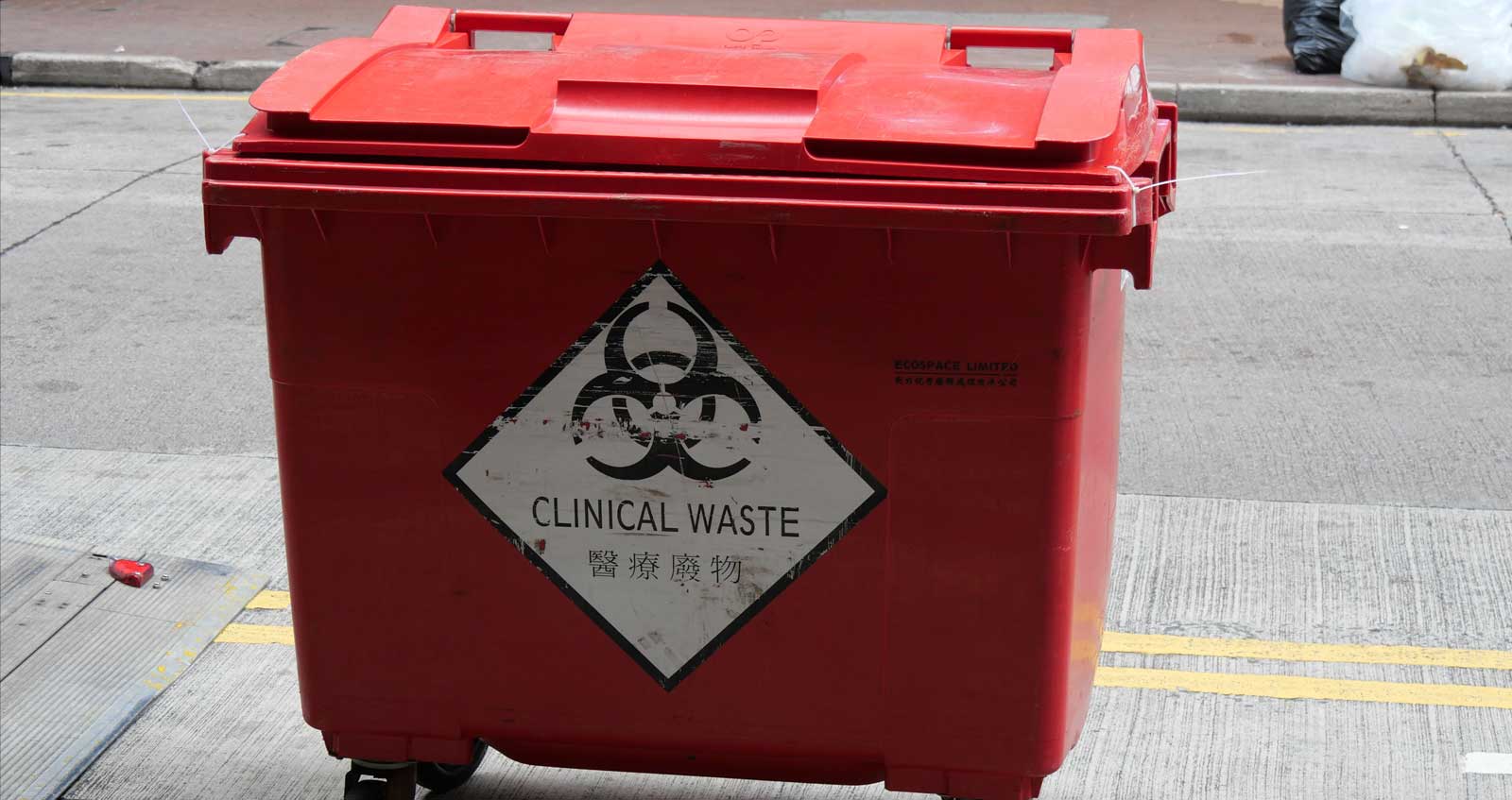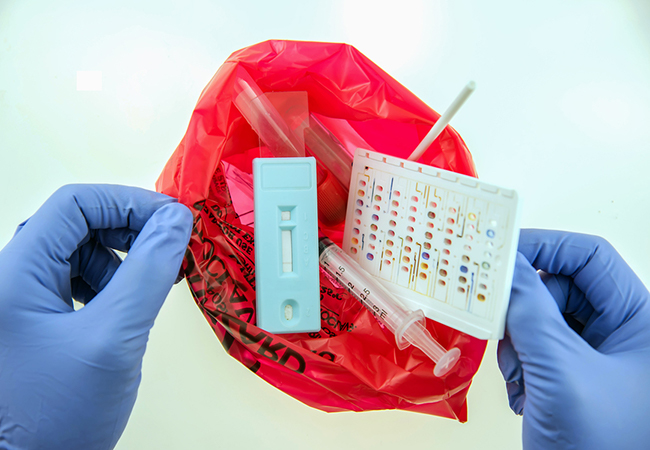Medical Waste Removal Mastery: Where Service Excellence Meets Health And Wellness Requirements
Medical Waste Removal Mastery: Where Service Excellence Meets Health And Wellness Requirements
Blog Article
Reducing Risks and Protecting Public Health And Wellness: The Role of Medical Garbage Disposal
In today's world, where public health and wellness problems are frequently on the increase, the proper management and disposal of clinical waste play a critical role in minimizing threats and securing the wellness of neighborhoods. As medical centers produce a significant amount of waste that can potentially present major health and ecological risks, it becomes vital to understand the importance of carrying out effective approaches for its safe handling. In this conversation, we will certainly explore the risks connected with poor medical waste administration, look into the regulations and standards that control its disposal, and highlight the benefits of embracing safe methods. By diving right into this topic, we will certainly uncover the essential role medical waste disposal plays in shielding public wellness and the atmosphere.
Value of Appropriate Clinical Waste Disposal
Appropriate medical garbage disposal is of utmost importance in ensuring the safety and security of medical care workers and the general public. medical waste disposal services with WasteX. Clinical waste, which includes items such as used needles, syringes, infected materials, and pharmaceutical waste, poses significant health and wellness threats if not disposed of appropriately
The key reason for proper clinical garbage disposal is to stop the transmission of infectious diseases. Health care workers are particularly at risk to contracting and spreading out illness through direct exposure to polluted waste. By applying appropriate disposal approaches, such as using puncture-resistant containers and guaranteeing the right segregation of various sorts of waste, the risk of infection can be lessened.
In addition, correct clinical waste disposal is essential for protecting the environment. Some medical waste consists of harmful chemicals and materials that can contaminate soil and water sources if not handled properly.
In enhancement to protecting human health and the environment, proper medical waste disposal also contributes in preserving the reputation and trust fund of medical care organizations. Correct disposal methods demonstrate a dedication to security and professionalism and reliability, which is vital for keeping public confidence in medical care services.
Threats Related To Inadequate Medical Waste Monitoring
Inadequate clinical waste monitoring postures significant threats to public health and the environment. Improper disposal of medical waste can lead to the spread of infectious illness, contamination of water sources, and the release of toxic chemicals into the atmosphere. Among the main dangers linked with inadequate medical waste administration is the transmission of infections. When medical waste, such as used syringes or infected dressings, is not taken care of correctly, it can enter contact with individuals, bring about the spread of illness such as HIV, liver disease B, and tuberculosis.
An additional risk is the contamination of water resources. Incorrect disposal of medical waste can result in the release of unsafe chemicals and microorganisms into water bodies, infecting the supply of water and posing a threat to both animal and human health. This contamination can occur via the incorrect disposal of pharmaceuticals or the discharge of unattended clinical waste right into water bodies.
Furthermore, insufficient medical waste administration can lead to the launch of harmful chemicals right into the environment. Lots of clinical items include dangerous materials, such as mercury, lead, or radioactive products. If these materials are not gotten rid of effectively, they can leach into the soil or water, presenting a hazard to ecosystems and human health.

Efficient Approaches for Medical Waste Handling
Carrying out safe and effective techniques for the handling of medical waste is critical in making certain the protection of public health and the environment. Clinical waste, such as sharps, contaminated materials, and drugs, can position significant threats if not managed properly. To alleviate these risks, health care facilities must adopt efficient strategies for clinical waste handling.
Proper partition includes separating various kinds of waste at the point of generation. Health care centers see it here need to offer clear standards and training to team on how to segregate waste appropriately.
Medical waste ought to be stored in watertight and puncture-resistant containers that are classified suitably. Normal examinations and upkeep of these containers are required to ensure their stability.
Correct documentation is also essential for efficient clinical waste handling. Healthcare facilities need to maintain accurate records of the type and quantity of waste produced, as well as the disposal techniques used. This documents assists in monitoring and tracking waste monitoring methods, ensuring conformity with regulations, and identifying locations for improvement.
Finally, healthcare facilities need to establish clear protocols for the transportation and disposal of medical waste. This consists of functioning with trusted and qualified waste administration business that comply with proper handling, therapy, and disposal procedures. Routine audits and examinations must be performed to validate compliance with guidelines and sector ideal techniques.

Regulations and Standards for Medical Waste Disposal
To make sure the appropriate and safe management of clinical waste, health care facilities must abide by laws and guidelines established by pertinent authorities. These regulations and standards are established to secure public health and wellness, avoid ecological contamination, and minimize the risk of infectious diseases.
In several nations, such as the United States, the monitoring of clinical waste is subject to strict laws enforced by federal government companies such as the Environmental Security Agency (EPA) and the Occupational Safety And Security and Health Administration (OSHA) These guidelines detail the needs for the segregation, packaging, labeling, storage, transport, and disposal of clinical waste. medical waste removal services. They also provide standards on the usage of individual safety tools (PPE) and the execution of infection control actions
Medical care facilities are required to establish and carry out thorough medical waste monitoring plans that address all elements of waste handling. These strategies should consist of treatments for waste segregation, making use of proper containers, staff member training on waste monitoring practices, and normal surveillance and bookkeeping of waste handling procedures.
Additionally, healthcare facilities must preserve accurate records of their waste management tasks and make certain that garbage disposal is accomplished by accredited and certified waste management business (medical waste disposal services with WasteX). Non-compliance with her latest blog these policies can lead to penalties, penalties, and lawful effects
Advantages of Safe Medical Waste Disposal for Public Health And Wellness
Proper adherence to policies and guidelines for medical waste disposal not only makes sure the secure management of waste but additionally uses substantial advantages for public wellness. The risk-free disposal of clinical waste plays an essential function in stopping the spread of contagious illness and safeguarding the wellness of medical care workers, individuals, and the public.
One of the main benefits of risk-free clinical waste disposal is the reduction of disease transmission. Clinical waste, such as used needles and polluted products, can harbor transmittable pathogens that posture a severe risk to human health and wellness.
Additionally, secure medical garbage disposal also assists to mitigate environmental air pollution. Improper disposal of medical waste can bring about the contamination useful reference of water, soil, and air, which can have destructive impacts on communities and public health and wellness. By following correct disposal protocols, the danger of ecological pollution is minimized, making sure the wellness of both human beings and the environment.
In enhancement, proper medical garbage disposal techniques also add to the general performance and sustainability of medical care systems. By implementing risk-free disposal techniques, medical care centers can reduce the risk of accidents, injuries, and infections among their personnel, causing boosted productivity and reduced healthcare expenses.
Final Thought
In final thought, ensuring proper medical waste disposal is crucial for decreasing risks and protecting public health and wellness. By implementing secure clinical waste disposal methods, we can secure public health and create a healthier environment for all - medical waste removal near me.
In today's world, where public health and wellness issues are continuously on the rise, the correct administration and disposal of clinical waste play a critical function in reducing threats and protecting the health of neighborhoods. By delving into this subject, we will reveal the essential role medical waste disposal plays in protecting public health and wellness and the environment.
Incorrect disposal of clinical waste can lead to the release of damaging chemicals and virus into water bodies, infecting the water supply and positioning a threat to both human and animal health.In conclusion, guaranteeing proper medical waste disposal is essential for lowering risks and securing public health. By carrying out secure medical waste disposal methods, we can guard public health and create a much healthier setting for all.
Report this page